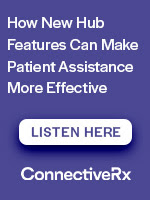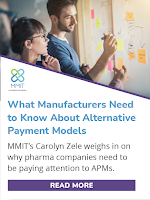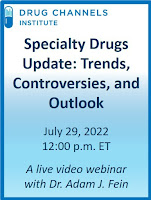This week, I’m rerunning some popular posts while I prepare for today's live video webinar: Specialty Drugs Update: Trends, Controversies, and Outlook .
Note that the forecasts below did not account for policy changes that could further reduce pharmaceuticals' share of U.S. healthcare spending.
Click here to see the original post from April 2022.
The econowonks at the Centers for Medicare & Medicaid Services (CMS) recently released the latest projections for U.S. spending on healthcare. (See links below.) These data provide our first official look at post-pandemic U.S. healthcare spending.
As you will see below, outpatient prescription drugs dispensed by retail and mail pharmacies are projected to remain a small share (8.4%) of total U.S. healthcare spending. What’s more, taxpayers—via Medicare and Medicaid—will continue to crowd out the private insurance market. One bright spot: consumers will account for an ever-smaller share of drug spending.
Thus, the government actuaries expect that pharmaceuticals will not be the key driver of U.S. healthcare spending growth. Will someone tell our elected officials?
Pages
▼
Friday, July 29, 2022
Thursday, July 28, 2022
Gross-to-Net Bubble Update: 2021 Pricing Realities at 10 Top Drugmakers (rerun)
This week, I’m rerunning some popular posts while I prepare for this Friday’s live video webinar: Specialty Drugs Update: Trends, Controversies, and Outlook .
Click here to see the original post from May 2022.
Time for Drug Channels’ annual update on pricing at the largest pharmaceutical manufacturers. This year’s review includes 10 companies: Eli Lilly and Company, Genentech, GlaxoSmithKline, Janssen, Merck, Novartis, Novo Nordisk, Sanofi, Takeda, and UCB. You can find links to each company’s data below.
When rebates and discounts were factored in, brand-name drug prices declined—or grew slowly—in 2021. Consistent with our previous analyses, rebates and discounts reduced the selling prices of brand-name drugs to less than half of their list prices.
What’s more, average net drug prices have declined for the past five years—though a few companies had net price gains or slower declines in 2021.
As I have pointed out many times, pharma industry perma-critics refuse to accept that brand-name drug prices are falling—or that prescription drug spending is a small and stable portion of overall U.S. healthcare expenditures. That’s why I refer to them as drug pricing flat earthers (#DPFE).
As famous economist John Maynard Keynes reportedly said: “When the facts change, I change my mind.” What will the DPFEs do?
Click here to see the original post from May 2022.
Time for Drug Channels’ annual update on pricing at the largest pharmaceutical manufacturers. This year’s review includes 10 companies: Eli Lilly and Company, Genentech, GlaxoSmithKline, Janssen, Merck, Novartis, Novo Nordisk, Sanofi, Takeda, and UCB. You can find links to each company’s data below.
When rebates and discounts were factored in, brand-name drug prices declined—or grew slowly—in 2021. Consistent with our previous analyses, rebates and discounts reduced the selling prices of brand-name drugs to less than half of their list prices.
What’s more, average net drug prices have declined for the past five years—though a few companies had net price gains or slower declines in 2021.
As I have pointed out many times, pharma industry perma-critics refuse to accept that brand-name drug prices are falling—or that prescription drug spending is a small and stable portion of overall U.S. healthcare expenditures. That’s why I refer to them as drug pricing flat earthers (#DPFE).
As famous economist John Maynard Keynes reportedly said: “When the facts change, I change my mind.” What will the DPFEs do?
Wednesday, July 27, 2022
DCI’s Top 15 Specialty Pharmacies of 2021—And Three Factors That Will Reshape 2022 (rerun)
This week, I’m rerunning some popular posts while I prepare for this Friday’s live video webinar: Specialty Drugs Update: Trends, Controversies, and Outlook .
One update to the list below: CVS Health has quietly purchased AmerisourceBergen's US Bioservices specialty pharmacy.
Click here to see the original post from May 2022.
In Drug Channels Institute’s list of the top 15 pharmacies of 2021, we show that central-fill, mail pharmacies operated by large PBMs and health insurers have displaced retail chains as the largest prescription drug dispensers by revenues.
To complement that broader ranking, we present below our exclusive and updated list of the top 15 pharmacies based on specialty drug dispensing revenues in 2021. You will see that PBMs and insurers retained their dominance over specialty dispensing.
But as I explain below, 2022 will be a year of transition. Significant volume will shift to the larger players, as Centene plots its exit, Walgreens’ specialty pharmacy business collapses, and manufacturers’ 340B contract pharmacy restrictions continue.
This week, I’m attending Asembia’s Specialty Pharmacy Summit. In a future article, I’ll violate Vegas code and tell you what happened.
One update to the list below: CVS Health has quietly purchased AmerisourceBergen's US Bioservices specialty pharmacy.
Click here to see the original post from May 2022.
In Drug Channels Institute’s list of the top 15 pharmacies of 2021, we show that central-fill, mail pharmacies operated by large PBMs and health insurers have displaced retail chains as the largest prescription drug dispensers by revenues.
To complement that broader ranking, we present below our exclusive and updated list of the top 15 pharmacies based on specialty drug dispensing revenues in 2021. You will see that PBMs and insurers retained their dominance over specialty dispensing.
But as I explain below, 2022 will be a year of transition. Significant volume will shift to the larger players, as Centene plots its exit, Walgreens’ specialty pharmacy business collapses, and manufacturers’ 340B contract pharmacy restrictions continue.
This week, I’m attending Asembia’s Specialty Pharmacy Summit. In a future article, I’ll violate Vegas code and tell you what happened.
Tuesday, July 26, 2022
Warped Incentives Update: The Gross-to-Net Bubble Exceeded $200 Billion in 2021 (rerun)
This week, I’m rerunning some popular posts while I prepare for this Friday’s live video webinar: Specialty Drugs Update: Trends, Controversies, and Outlook .
ICYMI, the unimplemented rule to reform rebates in Medicare Part D remains the ultimate budget gimmick. More than $122 billion in "savings" (offsets) from the current drug pricing reconciliation legislation comes from blocking rebate reform—which never even happened.
Click here to see the original post from March 2022.
Time for Drug Channels Institute’s annual update on the gross-to-net bubble—the ever-growing dollar gap between sales at brand-name drugs' list prices and their sales at net prices after rebates and other reductions.
We estimate that the gross-to-net bubble reached $204 billion for patent-protected brand-name drugs in 2021. If we include brand-name drugs that have lost patent protection and face competition from generic equivalents, the bubble was even higher, at $236 billion.
Pharmaceuticals are the only part of the U.S. healthcare system in which the difference between list and net prices is monetized as rebates and redistributed via intermediaries to payers. This bubble reflects—and drives—both patients’ affordability problems, intermediaries' warped incentives, and politicians’ misunderstandings of U.S. drug prices.
Read on for our latest data—and a reminder why SpongeBob SquarePants remains a fixture on Drug Channels.
ICYMI, the unimplemented rule to reform rebates in Medicare Part D remains the ultimate budget gimmick. More than $122 billion in "savings" (offsets) from the current drug pricing reconciliation legislation comes from blocking rebate reform—which never even happened.
Click here to see the original post from March 2022.
Time for Drug Channels Institute’s annual update on the gross-to-net bubble—the ever-growing dollar gap between sales at brand-name drugs' list prices and their sales at net prices after rebates and other reductions.
We estimate that the gross-to-net bubble reached $204 billion for patent-protected brand-name drugs in 2021. If we include brand-name drugs that have lost patent protection and face competition from generic equivalents, the bubble was even higher, at $236 billion.
Pharmaceuticals are the only part of the U.S. healthcare system in which the difference between list and net prices is monetized as rebates and redistributed via intermediaries to payers. This bubble reflects—and drives—both patients’ affordability problems, intermediaries' warped incentives, and politicians’ misunderstandings of U.S. drug prices.
Read on for our latest data—and a reminder why SpongeBob SquarePants remains a fixture on Drug Channels.
Monday, July 25, 2022
The Top Pharmacy Benefit Managers of 2021: The Big Get Even Bigger (rerun)
This week, I’m rerunning some popular posts while I prepare for this Friday’s live video webinar: Specialty Drugs Update: Trends, Controversies, and Outlook.
Click here to see the original post from April 2022.
The highly-consolidated PBM market notched another year of increased concentration.
Consider Drug Channels Institute's latest estimates of pharmacy benefit manager (PBM) market share, shown in the chart below. For 2021, we estimate that the three biggest PBMs accounted for 80% of total equivalent prescription claims. Significant business relationships among the largest companies continue to shift market share.
As I explain below, the prospects for market disruption remain low, so the controversial warped incentives of the rebate system will continue to distort the drug channel.
Click here to see the original post from April 2022.
The highly-consolidated PBM market notched another year of increased concentration.
Consider Drug Channels Institute's latest estimates of pharmacy benefit manager (PBM) market share, shown in the chart below. For 2021, we estimate that the three biggest PBMs accounted for 80% of total equivalent prescription claims. Significant business relationships among the largest companies continue to shift market share.
As I explain below, the prospects for market disruption remain low, so the controversial warped incentives of the rebate system will continue to distort the drug channel.
Friday, July 22, 2022
The New Hub Features Improving Patient Assistance
Today’s guest post comes from Ian Ocilka, Senior VP of Client Solutions at ConnectiveRx.
Ian shares an overview of The Evolving Role of Hubs and Patient Services, his recent presentation at Informa Connect's Hub and Specialty Model East conference in June.
Click here to watch Ian’s full presentation.
Read on for Ian’s insights.
Ian shares an overview of The Evolving Role of Hubs and Patient Services, his recent presentation at Informa Connect's Hub and Specialty Model East conference in June.
Click here to watch Ian’s full presentation.
Read on for Ian’s insights.
Wednesday, July 20, 2022
Drug Channels News Roundup, July 2022: CVS vs. NACDS, ICER Impact, Biosimilar Boom, Deductible Doubts, and Alto Pharmacy (and me)
Cut through the steamy summer haze with our refreshing selection of articles and insights. In this issue:
P.S. Join my nearly 30,000 (!) LinkedIn followers for daily links to neat stuff. You can also find my daily posts at @DrugChannels on Twitter, where I have more than 14,700 followers.
- CVS disassociates itself from its chain pharmacy association
- Payers are paying attention to ICER
- Benefits of the biosimilar boom
- A fantastic takedown of health insurance deductibles
P.S. Join my nearly 30,000 (!) LinkedIn followers for daily links to neat stuff. You can also find my daily posts at @DrugChannels on Twitter, where I have more than 14,700 followers.
Join me next week for my new live video webinar, Specialty Drugs Update: Trends, Controversies, and Outlook, on July 29, 2022, from 12:00 p.m. to 1:30 p.m. ET. I’ll cover market trends, payer strategies, channel developments, key trends that will help you plan for the future, and more. Click here for details and registration info.
Monday, July 18, 2022
Informa Connect’s Medicaid Drug Rebate Program (MDRP) Summit
Informa Connect’s Medicaid Drug Rebate Program (MDRP) Summit
Hybrid Event
October 12-14, 2022 | Chicago, IL
www.informaconnect.com/MDRP
Don’t miss the Medicaid Drug Rebate Program Summit coming up this fall in Chicago (or virtually). You'll return to the office having mastered complex regulatory guidelines to deliver compliant government pricing and reporting programs. MDRP 2022 is your chance to hear directly from the government regulators creating the rules, the industry leaders interpreting them and the manufacturer experts implementing them – You won’t want to miss it!
View the agenda to see the complete picture – the program, speakers, and more, and visit www.informaconnect.com/MDRP for further details and to register. Drug Channels readers will save 10% off when they use code 22DRCH10 and register prior to August 12, 2022.*
MDRP Agenda Highlights Include:
Don’t miss the chance to conquer the complex, ever-evolving regulatory guidelines and accelerate your career by sourcing world-class content and everyone who matters in Medicaid.
View the agenda to see the complete picture – the program, speakers, and more, and visit www.informaconnect.com/MDRP for further details and to register. Drug Channels readers will save 10% off when they use code 22DRCH10 and register prior to August 12, 2022.*
*Cannot be combined with other offers or used towards a current registration. Cannot be combined with special category rates or other offers. Other restrictions may apply.
The content of Sponsored Posts does not necessarily reflect the views of Pembroke Consulting, Inc., Drug Channels, or any of its employees. To find out how you can promote an event on Drug Channels, please contact Paula Fein (paula@drugchannels.net).
Hybrid Event
October 12-14, 2022 | Chicago, IL
www.informaconnect.com/MDRP
Don’t miss the Medicaid Drug Rebate Program Summit coming up this fall in Chicago (or virtually). You'll return to the office having mastered complex regulatory guidelines to deliver compliant government pricing and reporting programs. MDRP 2022 is your chance to hear directly from the government regulators creating the rules, the industry leaders interpreting them and the manufacturer experts implementing them – You won’t want to miss it!
View the agenda to see the complete picture – the program, speakers, and more, and visit www.informaconnect.com/MDRP for further details and to register. Drug Channels readers will save 10% off when they use code 22DRCH10 and register prior to August 12, 2022.*
MDRP Agenda Highlights Include:
- Congressional Insights from the Senior Health Advisor to the Senate Committee on Finance
- Examination of the 30 Year History of 340B, with current insights into the latest litigation
- Coverage on FSS Refresh and Life Cycle, PLUS sessions on other federal, state and local contracting agreements that you may be missing
- Insights into Patient Support and Patient Assistance Programs and how they affect you
- Updates on all the implications of recent rules and proposed regulations
- Strategies for Emerging, Small and Mid-Size companies
- Back by Popular Demand: Government Pricing and Reporting 101 Workshop, State Dispute Meetings and the Town Hall with States and Manufacturers, and the Half-day Workshop which includes the State-by-State review of legal requirements and operational challenges for State Drug Price Reporting and Transparency
- Perspectives from 60+ experts, representing companies such as Apexus, AstraZeneca, Blueprint Medicines, Bristol Myers Squibb, Chiesi USA, CSL Behring, Deciphera Pharmaceuticals, Gainwell Technologies, Genentech, Gilead, Mallinckrodt, Novartis, Pfizer, Regeneron, United Therapeutics, Vifor Pharma and more!
- And so much more!
Don’t miss the chance to conquer the complex, ever-evolving regulatory guidelines and accelerate your career by sourcing world-class content and everyone who matters in Medicaid.
View the agenda to see the complete picture – the program, speakers, and more, and visit www.informaconnect.com/MDRP for further details and to register. Drug Channels readers will save 10% off when they use code 22DRCH10 and register prior to August 12, 2022.*
*Cannot be combined with other offers or used towards a current registration. Cannot be combined with special category rates or other offers. Other restrictions may apply.
The content of Sponsored Posts does not necessarily reflect the views of Pembroke Consulting, Inc., Drug Channels, or any of its employees. To find out how you can promote an event on Drug Channels, please contact Paula Fein (paula@drugchannels.net).
Friday, July 15, 2022
What Manufacturers Need to Know About Alternative Payment Models
Today’s guest post comes from Carolyn Zele, Senior Manager of Solution Enablement at MMIT.
Carolyn explains the advantages of alternative payment models (APM) for measuring and rewarding value and outcomes in our healthcare system. For more on how APMs measure value, click here to learn about MMIT’s Pulse Analytics Solution.
Read on for Carolyn’s insights.
Carolyn explains the advantages of alternative payment models (APM) for measuring and rewarding value and outcomes in our healthcare system. For more on how APMs measure value, click here to learn about MMIT’s Pulse Analytics Solution.
Read on for Carolyn’s insights.
Tuesday, July 12, 2022
Exclusive: Five Pharmacy Chains and PBMs Dominate 2022’s Still-Booming 340B Contract Pharmacy Market
Despite what you may have heard, pharmacy participation in the 340B Drug Pricing Program continues to thrive.
Drug Channels Institute’s latest analysis reveals that an astonishing 32,000 pharmacy locations—more than half of the entire U.S. pharmacy industry—now act as contract pharmacies for the hospitals and other healthcare providers that participate in the 340B program. Over the past 12 months, the number of pharmacies in the program has grown by more than 2,000 locations.
What’s more, five multi-billion-dollar, for-profit, publicly traded pharmacy chains and PBMs—CVS Health, Walgreens, Cigna (via Express Scripts), UnitedHealth Group (via OptumRx), and Walmart—account for three-quarters of all 340B contract pharmacy relationships with covered entities. Is this really what Congress intended when the 340B program was established in 1992?
Manufacturers’ contract pharmacy restrictions have slowed the out-of-control program growth—with some unanticipated benefits for the biggest players. Read on for details and my commentary below.
For more on 340B and the specialty market, join me for my upcoming July 29 live video webinar, Specialty Drugs Update: Trends, Controversies, and Outlook.
Drug Channels Institute’s latest analysis reveals that an astonishing 32,000 pharmacy locations—more than half of the entire U.S. pharmacy industry—now act as contract pharmacies for the hospitals and other healthcare providers that participate in the 340B program. Over the past 12 months, the number of pharmacies in the program has grown by more than 2,000 locations.
What’s more, five multi-billion-dollar, for-profit, publicly traded pharmacy chains and PBMs—CVS Health, Walgreens, Cigna (via Express Scripts), UnitedHealth Group (via OptumRx), and Walmart—account for three-quarters of all 340B contract pharmacy relationships with covered entities. Is this really what Congress intended when the 340B program was established in 1992?
Manufacturers’ contract pharmacy restrictions have slowed the out-of-control program growth—with some unanticipated benefits for the biggest players. Read on for details and my commentary below.
For more on 340B and the specialty market, join me for my upcoming July 29 live video webinar, Specialty Drugs Update: Trends, Controversies, and Outlook.
Monday, July 11, 2022
Informa Connect's Hub and Specialty Pharmacy Models West
Informa Connect's Hub and Specialty Pharmacy Models West
Delivered as a Hybrid Event
September 14-15, 2022
Sheraton San Diego Hotel & Marina | San Diego, CA
www.informaconnect.com/hub-specialty-pharmacy-west
Drug Channels readers will save 10% off the current registration rate when they use code 22DC10*.
This important event convenes key stakeholders including manufacturers, specialty pharmacies, hub providers and more for unrivaled collaboration to leverage innovation and optimize access. Harness data-driven tech offerings to combat the urgent public health crisis and provide patients and stakeholders with unrivaled support services in an all-encompassing state-of-the-art hub.
Featured Presentations Include:
Drug Channels readers will save 10% off the current registration rate when they use code 22DC10*.
*Offer applies to current rates only and may not be combined with other offers, category rates, promotions or applied to an existing registration. Offer not valid on workshop only or academic/non-profit registrations.
The content of Sponsored Posts does not necessarily reflect the views of Pembroke Consulting, Inc., Drug Channels, or any of its employees. To find out how you can promote an event on Drug Channels, please contact Paula Fein (paula@drugchannels.net).
Delivered as a Hybrid Event
September 14-15, 2022
Sheraton San Diego Hotel & Marina | San Diego, CA
www.informaconnect.com/hub-specialty-pharmacy-west
Drug Channels readers will save 10% off the current registration rate when they use code 22DC10*.
This important event convenes key stakeholders including manufacturers, specialty pharmacies, hub providers and more for unrivaled collaboration to leverage innovation and optimize access. Harness data-driven tech offerings to combat the urgent public health crisis and provide patients and stakeholders with unrivaled support services in an all-encompassing state-of-the-art hub.
Featured Presentations Include:
- Building a True Hub in Cell Therapy and Specific Disease States
- End-to-End Launch Excellence
- Changes to Medicare Part D – Pricing Transparency Panel
- Problem Solving Copay: Accumulators and Maximizers
- Embracing Alternative Forms of Interaction with Patients Compliantly
- HIPAA Enforcement Updates: Best Practices Intersecting with Privacy, Cyber Security, EHR Incentive Programs
- Profiling Partner Expectations and Excellence: What Makes a Good Vendor Partner in Hub Services?
- Leveraging AI and Predictive Analytics to Meet the Consumer at the Moment of Decision Making
- EHR Systems Imbedding Services to Automate and Drive Capabilities
- ePrior Authorization – 2023 Challenges: Release of Biosimilars
- Helping Manufacturers Monitor, Manage, and Audit 340b Purchases
- State of the Industry – Public Health Crisis
- Problem Solving Copay: Accumulators and Maximizers
- Luminary Keynote Address and Patient Perspective: Pricing
- John M. O’Brien, Pharm. D., M.P.H., President and CEO, National Pharmaceutical Council
- Julie Ritchie Wagner, Senior Assistant General Counsel, Head of Global Ethics, Compliance, and Enforcement Legal Policy, PhRMA
- Joel White, Founder and President, Horizon Government Affairs
- Charlene Keller Fullmer, Assistant U.S. Attorney and Deputy Chief, Affirmative Litigation, US Attorney’s Office Eastern District of Pennsylvania
- Rachael Honig, Former Acting U.S. Attorney, U.S. Attorney’s Office District of NJ
- Jason Gould, Chief of the Healthcare Fraud Unit, U.S. Attorney’s Office District of NJ
- Gustav W. Eyler, Director, Consumer Protection Branch, U.S. Department of Justice
- Tom Tsillpetros, Senior Director of Patient and Provider Support and Specialty Pharmacy Relations, Fresenius Kabi
- Tricia Sterling, Vice President Patient Affairs, Aeglea
- Alicia Dixon, Sr. Director, Cell Therapy Operations and Patient Services, Gamida Cell
- Austin Fisher, Executive Director, CART Patient Support and Distribution, Autolus
- Chris Boneham, Vice President Market Access U.S., Y-mAbs Therapeutics
- Lakia Lewis-Latin, Associate Director, Program Management Strategy, Abbvie
- Sneha Dave, Executive Director, Generation Patient
- John Klimek, Senior Vice President, Standards & IT, NCPDP
- Pearl Pearson, Senior Director of Patient Support Services Dermatology, Respiratory and GI, Sanofi
- Jamie Anderson, CMA, AAMA, Prior Authorization Specialist, Biologics Coordinator, Cary Dermatology Center
- Kimberly Green Weir, Director, Specialty Drug Operations, Jazz Pharmaceuticals
Drug Channels readers will save 10% off the current registration rate when they use code 22DC10*.
*Offer applies to current rates only and may not be combined with other offers, category rates, promotions or applied to an existing registration. Offer not valid on workshop only or academic/non-profit registrations.
The content of Sponsored Posts does not necessarily reflect the views of Pembroke Consulting, Inc., Drug Channels, or any of its employees. To find out how you can promote an event on Drug Channels, please contact Paula Fein (paula@drugchannels.net).
Friday, July 08, 2022
GoodRx Pharma Manufacturer Solutions: Partnering for Patient Access and Affordability
Today’s guest post comes from Akeel Williams, VP of Strategy and Operations, Pharma Manufacturer Solutions at GoodRx
Akeel provides an overview of GoodRx’s Pharma Manufacturer Solutions business. He describes how GoodRx leverages its consumer reach to help biopharma companies boost awareness and utilization of manufacturers’ copay assistance programs.
Click here to learn more about GoodRx’s patient awareness, access, and adherence solutions.
Read on for Akeel’s insights.
Akeel provides an overview of GoodRx’s Pharma Manufacturer Solutions business. He describes how GoodRx leverages its consumer reach to help biopharma companies boost awareness and utilization of manufacturers’ copay assistance programs.
Click here to learn more about GoodRx’s patient awareness, access, and adherence solutions.
Read on for Akeel’s insights.
Thursday, July 07, 2022
How Copay Accumulators and Maximizers Have Changed Payers’ View of Copay Support
The boom in copay accumulators and maximizers has radically shifted payers’ views on manufacturers’ copay support programs for specialty drugs.
Below, I review a new survey of commercial plan sponsors and contrast the findings to a comparable survey from 2018. As you will see, plan sponsors now perceive manufacturers’ copay support patient assistance programs primarily as a source of funding for their own plans. This change in perspective has overtaken plan sponsors’ traditional views that copay programs disrupt formularies.
The accumulator/maximizer boom may soon start to slow. States are banning accumulators, the Medicaid accumulator rule has been blocked, and manufacturers are altering their copay programs. Plan sponsors may want to reconsider their beliefs before getting too comfortable with their copay money grab.
Below, I review a new survey of commercial plan sponsors and contrast the findings to a comparable survey from 2018. As you will see, plan sponsors now perceive manufacturers’ copay support patient assistance programs primarily as a source of funding for their own plans. This change in perspective has overtaken plan sponsors’ traditional views that copay programs disrupt formularies.
The accumulator/maximizer boom may soon start to slow. States are banning accumulators, the Medicaid accumulator rule has been blocked, and manufacturers are altering their copay programs. Plan sponsors may want to reconsider their beliefs before getting too comfortable with their copay money grab.
Wednesday, July 06, 2022
Specialty Drugs Update: Trends, Controversies, and Outlook (NEW Live Video Webinar)
Dr. Adam J. Fein, CEO of Drug Channels Institute (DCI) and the author of Drug Channels, invites you to join him for a new video webinar:
This event is part of The Drug Channels 2022 Video Webinar Series. Anyone who registered for the entire series will receive an email with a link to access the July event.
WHAT YOU WILL LEARN
Join Dr. Fein as he helps you and your team stay on top of the latest trends, market data, and strategies for specialty drugs. He will draw from exclusive information found in DCI’s industry economic reports.
During the event, Dr. Fein will cover a wide range of topics, including:
As always, Dr. Fein will clearly distinguish his opinions and interpretations from the objective facts and data.
Read on for full details on pricing and registration.
Specialty Drugs Update: Trends, Controversies, and Outlook
This event will be broadcast live on July 29, 2022,
from 12:00 p.m. to 1:30 p.m. ET
This event is part of The Drug Channels 2022 Video Webinar Series. Anyone who registered for the entire series will receive an email with a link to access the July event.
WHAT YOU WILL LEARN
Join Dr. Fein as he helps you and your team stay on top of the latest trends, market data, and strategies for specialty drugs. He will draw from exclusive information found in DCI’s industry economic reports.
During the event, Dr. Fein will cover a wide range of topics, including:
- Specialty drugs in pharmacy vs. medical benefits
- How plan sponsors are managing specialty benefits
- Distribution channels to providers, pharmacies, and patients
- DCI’s latest data on the specialty market position of distributors, pharmacies, and PBMs
- The latest on copay accumulators and maximizers
- Specialty carve-out and alternative funding programs
- Buy-and-bill trends
- The 340B Drug Pricing Program and specialty drugs
- Drug pricing controversies and policy debates
- And more!
As always, Dr. Fein will clearly distinguish his opinions and interpretations from the objective facts and data.
Read on for full details on pricing and registration.













